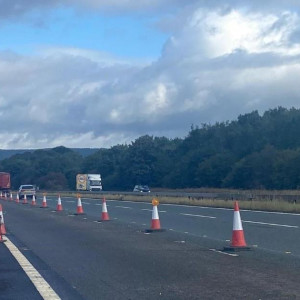More than 10,000 caught speeding through Cumbrian roadworks


The offences took place at the site of a major infrastructure project, prompting urgent safety warnings from both National Highways and police. The speeding violations were recorded south of Penrith near Lowther Bridge, where a two-year, ?9 million refurbishment scheme is underway. A 40mph speed limit is in place through the main roadworks, and average speed cameras became operational on June 12.
Steve Mason, programme manager at National Highways, said: "Safety is our number one priority. "Tens of thousands of people use this section of the M6 every day but for the sake of shaving an extra minute or two off their journey times, some drivers are putting their own safety and the safety of our roadworkers at risk. "Our staff and contractors are working around the clock to complete this project as quickly as possible, and they're entitled to do that safely without the threat of being maimed or killed by someone recklessly speeding through the roadworks."
The figures were revealed by the Cumbria Road Safety Partnership, and enforcement is being carried out by Cumbria Police. Inspector Jack Stabler, Cumbria Police's Roads Policing Unit lead and Chair of Cumbria's Road Safety Partnership, said: "Speed cameras aren't popular with some but the cameras currently in place on the M6 south of Penrith serve an extremely important purpose in allowing for the motorway to remain open whilst essential work is carried out. "As Chair of the county's Road Safety Partnership, I am concerned about the number of people choosing to ignore the speed limits currently in place on this small section of the M6.
"The cameras and speed restrictions are in place to protect workers carrying out road improvements so whilst the number of people fined may grab the headlines, the real concern is the number of people driving with a disregard for the lives of those who are in a vulnerable position, working alongside moving motorway traffic. "So please allow a few minutes more for your journey and think of the workers by the side of the road who, just like you, have families they would like to go home to." National Highways is warning that speeding in roadwork zones not only threatens the lives of roadworkers but also endangers drivers themselves.
The potential hazards include collisions with heavy machinery or entering hidden excavations behind temporary safety barriers. The 40mph limit has been put in place due to the lack of space for two open lanes in each direction and the absence of a standard temporary vehicle restraint system. Instead, cones are being used to manage traffic.
The project is being coordinated with a separate scheme by Network Rail, which is constructing a new railway bridge over the M6 at nearby Clifton. According to National Highways, this has necessitated temporary exit and entry slip roads on the northbound carriageway. The speed limit is introduced in stages, with a 50mph zone leading into the 40mph section and average speed cameras.
To improve compliance, National Highways has installed additional warning signs, including portable electronic displays showing the speed limit. The organisation estimates that driving at 40mph through the zone adds less than a minute to most journeys and spares people the inconvenience of a fine and penalty points. National Highways says the penalty for speeding in the zone is a ?100 fine and three penalty points on the driver's licence.
Mr Mason said: "Speeding plays a role in close to half of the collisions on our roads and we know collisions reduce if people drive at speeds that reflect the road environment and weather conditions. "Speed cameras in roadworks help improve safety and smooth traffic flow as well." The Lowther Bridge refurbishment is scheduled for completion in spring 2027.
Full details of the scheme are available on the National Highways website.